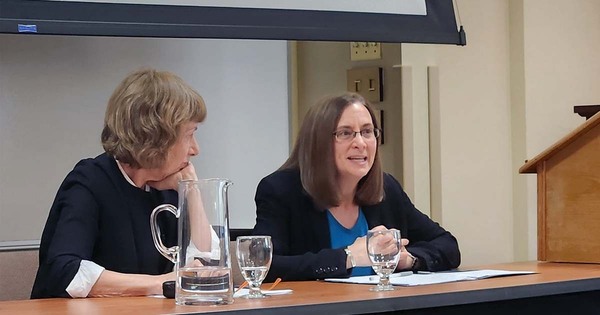Nanovic Faculty Fellow Debra Javeline shares her research in "What the Beslan School Siege Taught Us"
Debra Javeline is an associate professor of political science at the University of Notre Dame and a Nanovic faculty fellow. She recently published After Violence: Russia’s Beslan School Massacre and the Peace that Followed (2023). For its Spring 2023 edition, she shared her research and key findings with Notre Dame Magazine in an article entitled "What the Beslan School Siege Taught Us."
The following lines serve as the introduction to this piece, which delves into how the people in Beslan responded to the violence, the role and response of the Russian government, and more:
The worst act of terrorism in Russian history began as any other first day of school, with excitement and celebration. On September 1, 2004, in the small town of Beslan in southern Russia, schoolchildren and their teachers, families and other guests gathered at School No. 1, wearing their best clothes and ready to participate in rituals that date back to the 1930s. They expected the oldest students to lead the youngest to an assembly. A first-grade girl would sit on the shoulders of an 11th-grade boy and ring a bell to signify the beginning of the school year. The mood was happy and hopeful.
But instead of celebration, what followed was sheer horror. Terrorists herded some 1,200 attendees into cramped and stiflingly hot quarters, often with hands over their heads. People were threatened for talking or crying, denied food and water, and compelled to drink urine. Many children watched as their fathers were executed.
Russian authorities tried to claim that the perpetrators had links to Al Qaeda and global jihad and that they were an irrational, international gang of drug addicts making no demands — certainly not Russian citizens. In fact, most of the hostage takers were ethnic Ingush or Chechen, and almost all were citizens of Russia, homegrown terrorists, several of whom were on Russia’s wanted list. They included murderers, rapists, and thieves who later turned to devout Islam and the cause of Chechen independence.
Read the Full Story in Notre Dame Magazine

Javeline also held a book launch event at Notre Dame on April 25, 2023, welcoming panelists Maria Lipman, a Russian journalist, and Konstantin Sonin, John Dewey Distinguished Service Professor at the University of Chicago's Harris School of Public Policy. A. James McAdams, William M. Scholl Professor of International Affairs in the Department of Political Science and former director of the Nanovic Institute, moderated the discussion. This event was hosted by the Kroc Institute for International Peace Studies and co-sponsored by the Nanovic Institute for European Studies. More information can be found on the event archive page.
We congratulate Javeline on the successful publication of such important research and the insightful article in Notre Dame Magazine.
Originally published by at nanovic.nd.edu on May 26, 2023.
Latest Research
- Studying Survivor : How two Notre Dame courses apply reality TV to philosophy, psychology, and mathStudents…
- Junior Alex Young named 2025 Truman ScholarUniversity of Notre Dame junior Alex Young has been named a 2025 Truman Scholar. He is the University’s 13th Truman Scholar since 2010, a group that includes three Rhodes Scholars: Alex Coccia (’14), Christa Grace Watkins (’17) and Prathm Juneja (’20).
- Notre Dame listed as World Leader in Nuclear AstrophysicsNuclear astrophysics…
- “Contagious capitalism”: Keough School Dean Mary Gallagher shares research insights on law, labor and justice in ChinaMary Gallagher, the Marilyn Keough Dean of the Keough School of Global Affairs, delivered the fifth annual Justice and Asia Distinguished Lecture at the school’s Liu Institute for Asia and Asia Studies on April 8, drawing on her research expertise to share insights on law, labor and justice in China.
- Thirteenth Annual Harper Cancer Research DayRohit Bhargava The 13th annual…
- Two Notre Dame historians win Guggenheim fellowshipsTwo faculty members in the University of Notre Dame’s College of Arts & Letters have been awarded fellowships from the John Simon Guggenheim Memorial Foundation as part of its 100th class of honorees.













